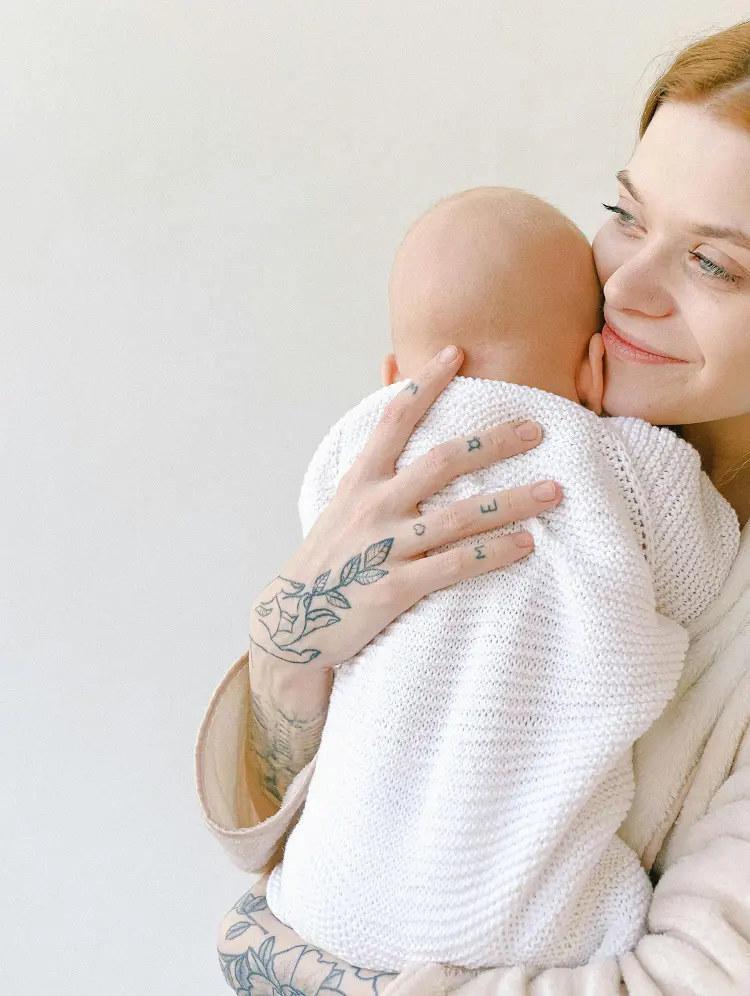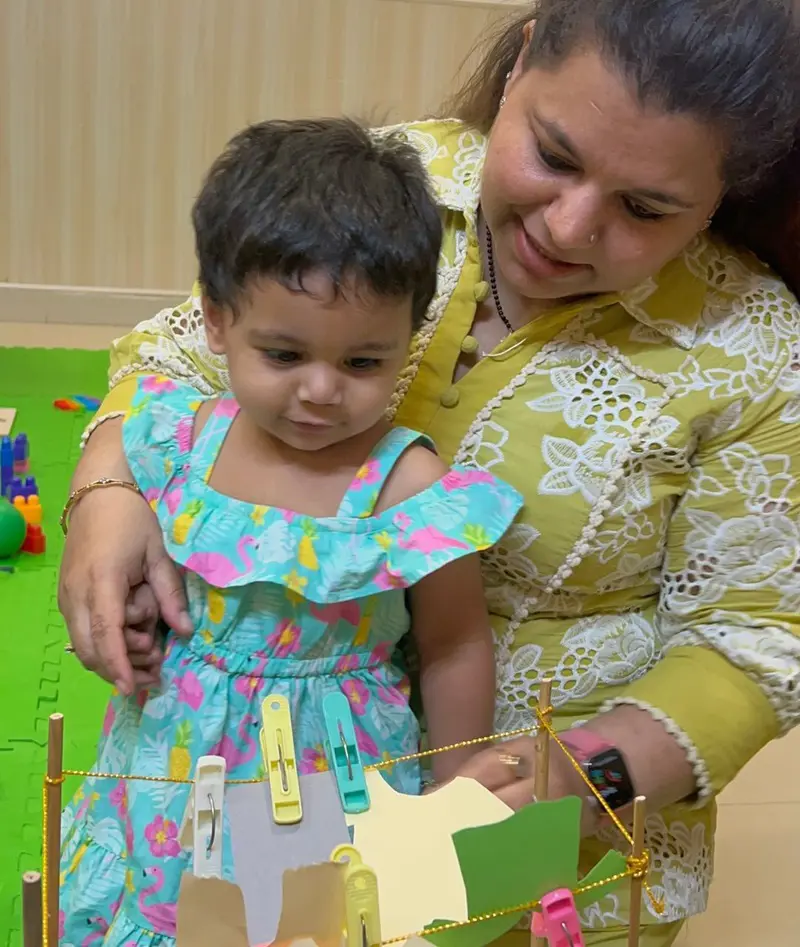Making your newborn sleep is one of the most challenging things to do, particularly during the first few months. You will be exhausted, and sleep-deprived, and will face challenges raising your baby. Luckily, we are here to help you to get your newborn to sleep with these practical methods.
First of all, creating the right sleeping environment is a must for your tiny human. Also, it is equally important to consider gentle sleep training along with bedtime routines. Continue reading till the end to understand more about getting your baby to sleep easily and effectively.
1. Swaddle Your Baby
The swaddling method is one of the most common methods to make a baby sleep peacefully. As their bodies are still in the process of development, the babies lack motor control and often twitch, flail their arms, and also move their legs during sleep. There is a high chance that these movements can wake them, this is why swaddling is a good option.
Remember to use a lightweight cotton blanket to prevent overheating. Also, leave room for the baby's hips and legs to move. When your baby rolls over on their own then stop swaddling, but this usually happens after 2 months or later.
2. Keep Your Baby Comfortable

Make sure to make your baby comfortable before putting them in the crib. Check whether the baby's diaper needs to change or not. Also, your baby should be dressed in appropriate layers for warmth, but don't overdress them. Check the room temperature before making your infant sleep. This is because a quiet, cozy, and calm environment will go a long way in helping your baby sleep.
It is also important to darken the room by turning off the main lights to soothe the baby and make fall asleep faster. You can also turn on a night light so your baby would get a little light to calm your baby.
3. Establish a Bedtime Routine
Start to create a soothing bedtime routine with your child as early as 6 to 8 weeks old. The routine should be calming and relaxing and avoid anything that are active or too stimulating. The main reason behind maintaining a routine is to signal your baby that sleep time is coming and without any fuss, they go to sleep easily.
You can include dressing your baby to sleep, a warm bath, singing a lullaby, and more as a bedtime routine for your baby.
4. Offer Them a Pacifier
According to research, a pacifier can really help calm your baby at night. But if you are a breastfeeding mother you should wait until your baby is about 3-4 weeks old before offering them a pacifier. After the baby falls asleep and their pacifier falls out, you don't need to put it back in their mouth.
However, it is not recommended to make your baby sleep with a bottle, as the milk or formula can pool in their mouth which eventually leads to dental decay as well as ear infections. So, be extremely cautious and mindful when it comes to your baby's health.
5. Maintain a Daily Routine

During the first few months, you can expect your baby's sleep to be completely disorganized as it takes almost 16 weeks for the circadian rhythm to mature. So, it's never too early or late to establish a proper sleep schedule for your little one.
There are various applications you can find that can track the sleep of your baby and thus you don't need to do all the hard work by yourself. Create a schedule that aligns with your baby's sleep rhythms, and the app will notify you each time your baby is ready for the next sleep.
6. Feeding Babies to Sleep
Feeding your baby can be the solution to help them fall asleep if the baby is extremely weary and has trouble settling. Breast milk has a unique ability to induce sleep in babies, so it's common for fatigued newborns to nod off during feedings.
Nevertheless, babies who are fed to sleep frequently wake up very early in the morning due to wind or the absence of a comforting, warm embrace.
After your baby becomes three months old, it is advised not to feed to put the baby to sleep as this would probably result in more or prolonged nighttime wakings.
7. Offer Baby Massage

Giving your infant a massage to help them fall asleep is another really helpful tip many mothers find. For some babies, there's nothing better than a warm, soothing massage to help them unwind and prepare for sleep.
However, ensure your infant is in a warm space and wears just the right amount of clothing, wearing too much will make it difficult for them to fall asleep. It's also a good idea to drape a warm blanket around one arm or leg at a time and massage that area. You can use natural oils, such as olive, almond, or baby oil, to massage your infant.
8. Create a Womb-like Environment
Having an environment that resembles the womb to calm your infant will be beneficial since it will make them feel at ease. White noise, gentle rocking, and swaddling all have this effect. Parents find it quite soothing to mimic the motion babies get used to in the womb by rocking the baby in their arms or using the baby's swing.
Something like a womb provides a comfortable environment to ensure that your baby does not have to struggle to fall back to sleep. These comforting techniques could reduce stress and promote more restful and restorative sleep.
9. Change the Baby's Diaper
Things like dirty or wet nappies may cause sleep disturbances and discomfort. When dressing your baby for sleep, ensure that they are in a clean nappy and that the nappy is dry. Consider using nighttime diapers which are designed to absorb more liquid and keep your little one dry longer.
A clean nappy makes it difficult for your baby to wake up in the middle of the night because they will be comfortable. For proper comfort and hygiene of the baby and to avoid any disturbance during the night, it is advisable to change the baby’s diaper before going to bed on a daily basis.
10. Use White Noise or a Baby Shusher

White noise machines or baby shushers are perfect for minimizing the background sounds in your home and maintaining a steady sound that will help your child sleep. These include waves in the ocean, the sound of a fan, or any other specifically manufactured noise-making machines.
White noise lowers the chances that your baby will be jolted by sudden noise since it dampens other sounds, making the environment quiet. It is especially beneficial to light sleepers as this constant auditory environment supports their capacity to fall asleep and wake up from sleep stages.
11. Make the Room Dark
Another helpful signal to your infant that it's time for sleep is a dark room. Make the room as dark as you can by closing the curtains during the day to keep light from entering when the baby is being breastfed or changing nappies.
This assists in their ability to distinguish between day and night, which helps with sleep training. Turning off the lights helps in the production of melatonin, which induces sleep, so your infant won't have any trouble going to asleep. Maintaining the baby's dark room both during the day and at night can help them develop a good relationship with darkness.
12. Check the Temperature of the Room

The ideal temperature that a baby should be exposed to is 68 to 72 degrees Fahrenheit (approximately 20 to 22 degrees Celsius). Your baby may find it difficult to sleep at a certain temperature that is either too hot or too cold.
For maintaining the ideal temperature, there is a room thermometer or thermostat. Ensure the infant is well covered in clothes that are appropriate for the weather and avoid the use of many blankets that can cause heat stroke. Also, make sure that your infant has a comfortable body temperature during the night so as not to sweat or shiver.
13. Let Baby Self-Soothe
Your baby will sleep for longer hours at a stretch if he or she is trained on how to self-settle. Place your baby in the cot while they are still awake but sleepy. It helps the children in the long end though they may fuss for some time when left alone to cool off.
Self-soothing helps to encourage independence and also has positive effects on the sleep pattern of your child. If developed, this ability will enable both you and your child to have more uninterrupted nights without having to wake up in the middle of the night and have to be put back to sleep.
14. Encourage Daytime Naps
You can keep your infant from getting overtired and irritable by making sure they get enough sleep during the day. Babies who are overtired frequently struggle harder at night to get to sleep and stay asleep. Make sure they snooze regularly during the day and don't let them sleep in too late.
A baby that gets enough sleep at night is likely to sleep through the night without any problems. Taking naps on a regular basis also aids in the regulation of their internal clock, which supports a healthy sleep-wake cycle and overall growth and wellbeing.
15. Watch for Sleep Cues

Take the time to learn your baby’s sleep cues which are crankiness, rubbing the eyes, or yawning. If your child shows these signs, then it is highly probable that the infant is tired and in need of a nap. Parents should be able to take children to bed when they show signs of drowsiness to ensure they do not get overstressed and have them struggle to sleep.
Otherwise, going to bed may proceed more smoothly and more to the point if the signals are identified and dealt with at an early stage. This conveys healthier sleep patterns and reduces bedtime woes as your baby learns that certain behaviors are associated with sleeping.
16. Be Patient with Night Waking
Infants tend to wake through the night for feedings and to have their nappy changed. However, when these wake-ups happen, maintain your calm and do not get impatient easily. If you want your infant to realize that it is still past bedtime, do not engage in loud talking and shouting.
If you take time to attend to them and do so patiently, your baby will be able to go back to sleep easily. I encourage you to tell yourself they are only at this stage for now and if you remain calm then you and your child will encounter fewer stressful episodes at night.
17. Keep Nighttime Feeding Quiet

Feed your baby during the night in a quiet and dim light environment throughout the session. Avoid engaging in things that are exciting or require a lot of talking. This helps the baby understand that nights are for sleeping and not for playing at all.
While at it, keep your voice low and also minimize the use of light. Hiking up feedings to the evening also assists in keeping the baby relatively groggy and thus easy to put back to bed at night, which is an advantage to the whole family.
18. Consider Gentle Sleep Training
Gentle sleep training techniques can teach your baby to fall asleep on their own if that's something you're comfortable with. Though they can be useful, techniques like the Ferber method and the cry-it-out method should be chosen based on your comfort level and parenting style.
Over time, gentle sleep training will decrease the need for nighttime interventions by gradually teaching your baby to self-soothe and go to sleep on their own. Maintain consistency and patience while modifying your approach in response to your baby's needs and reactions.
19. Start Separating
As your baby grows, gradually start separating from them at bedtime. This could mean moving from holding them until they fall asleep to placing them in their crib when they are drowsy but still awake. This helps them learn to fall asleep independently.
Separation fosters self-soothing skills and confidence in their ability to sleep on their own. Begin with small steps and progressively increase the time your baby spends settling themselves to sleep, ensuring they feel secure and supported throughout the process.
20. Stay Calm and Consistent

It's crucial to maintain composure and consistency because your infant can sense your feelings. Establish a consistent bedtime routine and follow it, even if your infant takes some time to get used to it. Patience and consistency will eventually pay off.
A consistent schedule eases your baby's transition to sleep by fostering a sense of security and preparing them for what to expect. Remain a soothing, comforting presence to help your infant go asleep and create a healthy sleep environment.
How Much Should a Newborn Sleep?
On average, newborns sleep for 14 to 17 hours in a day. Since they require frequent feedings in the initial weeks, they often nap for short intervals of two to four hours during the day and at night.
They are likely to have irregular sleeping patterns initially. Their sleep gradually becomes longer at night as they grow older. At three months, babies begin to have somewhat more predictable sleep patterns, and some of them can sleep through the night for several hours at a time.
For proper growth, it is important to observe and attend to the sleeping signals displayed by a child and also create a conducive environment for sleeping.








